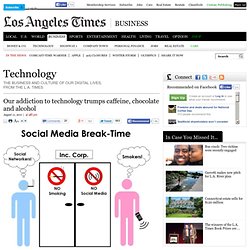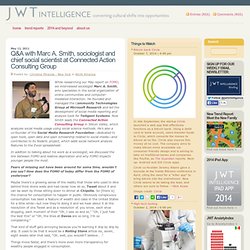

Our addiction to technology trumps caffeine, chocolate and alcohol. This probably sounds familiar: You're out to dinner with friends, and everything's fun, until you get that itch.

It's been 20 minutes, and you really want to check Facebook, or Twitter, or Foursquare or email. Forget about wanting; this is needing. You finally give in to the urge and sneakily check your phone under the table -- or fake an urgent visit to the bathroom, where you'll take a hit of the Internet while huddling in a stall. Anecdotally, our Internet use seems to have spawned real addictions. And according to several recently released surveys, we've got it bad. More than half of Americans would rather give up chocolate, alcohol and caffeine for a week before parting temporarily with their phones, according to a recent survey by technology firm TeleNav. One-third would give up sex, 22% would give up their toothbrushes (versus 40% of iPhone users, who evidently love their phone more than clean teeth) and 21% would rather go shoeless before separating from a mobile phone. -- Shan Li.
Are You A Victim Of Phantom Vibration Syndrome? You might laugh, but do you find yourself reaching for a vibrating phone in your pocket, only to discover that it's not there?

I've come across this so often that I've come to call it Phantom Vibration Syndrome. Think about it: How many times have you checked your phone today for messages, despite no sign or signal that there's one waiting in the inbox? What's going on in your brain that leads you to think that a message came through without you noticing it? Or, worse still, what makes you think that that the messages will somehow flow in faster if you check your phone more frequently?
Some years ago I conducted a major research study on smoking. In the study on smoking, we learned that the Mirror Neurons would kick-start a chain reaction in the smoker's brain, which would induce craving sensations. You may ask, what on earth this all has to do with you and your phone? Apart from habit, Phantom Vibration Syndrome is also about not being fully present.
Q&A with Marc A. Smith, sociologist and chief social scientist at Connected Action Consulting Group. While researching our May report on FOMO, we interviewed sociologist Marc A.

Smith, who specializes in the social organization of online communities and computer-mediated interaction. He founded and managed the Community Technologies Group at Microsoft Research and led the development of social media reporting and analysis tools for Telligent Systems. Now Smith leads the Connected Action Consulting Group in Silicon Valley, which analyzes social media usage using social science methods. He’s also a co-founder of the Social Media Research Foundation—dedicated to open tools, open data and open scholarship related to social media—and contributes to its NodeXL project, which adds social network analysis features to the Excel spreadsheet. In addition to talking about his work as a sociologist, we discussed the link between FOMO and relative deprivation and why FOMO impacts younger people the most. Fears of missing out have been around for some time, wouldn’t you say?
And it’s all in real time.